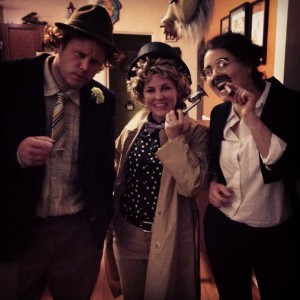Okay, so maybe the Marx Brothers didn’t really teach me to write poetry, but these wordplay magicians did ingrain in me a love of humor and language that helped seed my desire to manipulate language myself.
I’m not the only one still finding inspiration in the Marx Brothers’ comedy— The makers of Family Guy, Mickey Mouse and many others have re-enacted the famous mirror skit from Duck Soup. Woody Allen has referenced and quoted them in multiple movies, and even all the main characters in Rob Zombie’s House of a Thousand Corpses were named after Groucho’s movie characters. Good art is timeless.
It’s all about having the right bag of tricks. Like poetry, the landing of any good joke weighs heavily on timing, cadence, finding that perfect word, metaphor, phrasing, etc. The Marx Brothers did all of these things ridiculously, and ridiculously well.
Groucho’s cigars, fake spectacles, painted on eyebrows, and mustache were necessary props just as much as Chico’s Tyrolean hat and Harpo’s pantomime, bells, and whistles. They were as important as punctuation.
They shot one-liners with sniper precision:
“Whatever it is, I’m against it.” (Horse Feathers)
Every word in its place, a perfect line perfectly set up. But, similar to the final line of a poem, most one-liners are only as good as their set up:
Rufus T. Firefly (Groucho): Not that I care, but where is your husband?
Mrs. Teasdale: Why, he’s dead.
Rufus T. Firefly: I bet he’s just using that as an excuse.
Mrs. Teasdale: I was with him to the very end.
Rufus T. Firefly: No wonder he passed away.
Mrs. Teasdale: I held him in my arms and kissed him.
Rufus T. Firefly: Oh, I see, then it was murder. Will you marry me? Did he leave you any money? Answer the second question first.
Mrs. Teasdale: He left me his entire fortune.
Rufus T. Firefly: Is that so? Can’t you see what I’m trying to tell you? I love you. (Duck Soup)
This exchange was with actress Margaret Dumont, their most common “heavy.” She apparently did not find them funny.
Mrs. Rittenhouse: Captain, this leaves me speechless.
Capt. Spaulding (Groucho): Well, see that you remain that way. (Animal Crackers)
Lines like this could possibly have been why.
Their extended / running sight gags can be similar to a chorus of a song or a repeated line in a poem. The motorcycle bit in Duck Soup, is a good example— Multiple times throughout the movie, Groucho gets in the sidecar of the motorcycle Harpo is about to ride off on (“His Excellency’s Car!”); each time the motorcycle takes off without the sidecar, leaving Groucho behind. Until, finally, a fed up Groucho decides to ride the motorcycle, and Harpo “drives off” in the sidecar leaving the motorcycle and, once again, Groucho behind.
Running gags like this help hold the movies together, some of which have extremely loose plots and are at times largely stream of conscious digressions from one scene to another.
A common assumption is that Groucho carried the Marx Brothers. While he may have had the most prominent solo career, they all played equal parts in making their movies memorable. One of their funniest bits in A Night at the Opera (which was featured in an exhibit at the Smithsonian) would not have been anything without all three of them. Harpo and Chico infiltrate the orchestra in the pit and replace the lofty sheet music with “Take Me Out to the Ballgame.” They use violins to hit baseballs back and forth while Groucho sells peanuts to the opera’s audience. This is moments before Harpo begins a bow versus baton sword fight with the conductor of the orchestra.
They each had their own specialty. Chico’s fake “Italian” accent was his primary tool:
Chicolini: Now I aska you one. What has a trunk, but no key, weighs 2,000 pounds and lives in a circus?
Prosecutor: That’s irrelevant.
Chicolini: Irrelephant? Hey, that’sa that answer. There’s a whole lot of irrelephants in the circus. (Duck Soup)
Showing me, as a child watching my dad’s VHS tapes of their movies, even the misuse of language can be wonderful:
Fiorello: [Disguised as one of the world’s greatest aviators] So now I tell you how we fly to America. The first time we started we got-a half way there when we run out a gasoline, and we gotta go back. Then I take-a twice as much gasoline. This time we’re just about to land, maybe three feet, when what do you think: we run out of gasoline again. And-a back-a we go again to get-a more gas. This time I take-a plenty gas. Well, we get-a half way over, when what do you think happens: we forgot-a the airplane. So, we gotta sit down and we talk it over. Then I get-a the great idea. We no take-a gasoline, we no take-a the airplane. We take steamship, and that friends, is how we fly across the ocean. (A Night at the Opera)
Harpo is my personal favorite of the Marx Brothers. It’s in Harpo’s harp performances you glimpse the seriousness of their art, the intensity, concentration, sincerity, and sheer enjoyment. His pantomime is a language of its own. In Love Happy, the last movie they did as a team (also supposedly the first movie where advertisers partially funded the movie and received product placement in return), he does an adorable bit to cheer up the leading lady by pretending to juggle his eyeballs. The charades Groucho and Chico play with Harpo whenever Harpo needs to relay important information to them, fed many of Chico and Groucho’s jokes. He always seemed to be the heart of the team. Groucho was the cynic, Chico the con artist, and Harpo was there to cheer everyone up… and to be part goat— His characters eat neckties, cigars, coins, anything he can get his hands on. The breakfast scene in A Night at the Opera is one of the funniest things I have ever seen because Chico and Groucho mostly sit back and let Harpo wreak havoc on everything on the table.
The final two things I learned from the Marx Brothers are:
Know your strengths— They started as a terrible singing Vaudeville act, and only switched to comedy after Groucho began insulting a bored audience and the audience, in turn, laughed. Harpo felt his vocal delivery was lacking and switched to pantomime; Gummo and Zeppo never found their comedic stride and both eventually dropped out of the performance side of the act. What came out of this is some of the most perfect satire and comedy on film.
Learn the rules and break them when you need to— Whether consciously or not the Marx Brothers were fairly anti-establishment; they did not follow the rules of what many people in their time thought was required for a good movie, and yet they made some fantastic movies. Many of them did not have very extended plots, but they weren’t writing novels, were they? They were writing poetry.
 Marcella Benton lives in Lakeland, Florida with her husband and way too many pets. She and her husband run Whatever Tees, a screen printing and embroidery business.
Marcella Benton lives in Lakeland, Florida with her husband and way too many pets. She and her husband run Whatever Tees, a screen printing and embroidery business.
You can read Marcella’s poetry in Black Fox Issue 12.




Totally awesome. Marcie’s father introduced her to the Marx Brothers at a very young age. She has always been an extremely talented young ladyy.
I haven’t watched the Marx bros. but now I want to, and I also want to write poetry following my own rules. Thanks